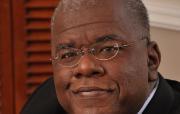
There is a very disturbing document making its way into universities in South Africa. It is the report of the so-called Transformation Oversight Committee that was instituted by Higher Education Minister Blade Nzimande to reveal the extent of change at the country's 23 public universities.
The thrust of the investigation is correct. We need universities that are truly open to the widest range of academic talent in South Africa and abroad. That means, for me, that we need more black and women academics and students in all our universities. We need more people with disabilities to access higher education and, yes, we need more white students on traditionally black campuses.
In other words, we need normal universities in our democracy that are not defined by their tragic histories of exclusion - be those exclusions on grounds of race or ethnicity or gender or language or ability to pay.
What we do not need, however, is a report that reduces the complexities of institutional transformation to an equity index in which you use a mathematical formula to measure the distance between "national demographics" and "organisational demographics" in each university; then rank the universities from best to worst, and declare some more transformed than others.
This kind of simplistic thinking that reduces transformation to pigmentation is simply the flipside of apartheid reasoning where biologically essentialised categories still matter.
Ironically, this report is a setback for transformation.
The report, to begin with, is a historical. Black universities are not transformed because they are black. The worst kinds of tribalism may exist in historically black universities. All but one of the historically black universities was set up by apartheid for separate tribal groupings; that is why they are black.
Some are very conservative. Other historically black universities are regularly trashed by their students, endure long strikes by their lecturers, or are placed under administration for poor management or governance or both. That is not transformation.
In addition, a university that merged with a black institution and is now labelled as "transformed" did not have to do anything to become that way.
Now, it is surely a matter of social justice that black students and academics excluded from former white universities be admitted in numbers. But transformation is something much deeper.
It implies profoundly qualitative changes in human relations where people are respected and embraced across the lines that divided us. It means that universities are humane places which reach out to those less privileged inside and outside in the surrounding communities.
It suggests a deep transformation of the curriculum that opens up knowledge beyond the narrow strictures of our lingering colonial and apartheid epistemologies.
It calls for intellectual spaces on campuses where orthodoxy is questioned and critical theories and methods of doing research and teaching are advanced.
It means opening up our universities, without extra charge, to students from Southern African countries if only to pay a debt to our neighbours for our destructive past.
This does not mean that historically white universities are off the hook. It is simply inexcusable that any university in our democracy can still be so overwhelmingly white in its academic and student bodies; and a university with a largely dominant white campus is clearly not serving its students or the country well.
That must change in ways that all South Africans, black and white, teach and research, as well as live and learn, together inside our universities.
Most universities (not all of them, sadly) are trying very hard to be more inclusive in both student recruitment and the headhunting of staff. It is not always easy.
Try to find a black dean of law or a black head of actuarial science or a black programme director in forensics, and you will see us vice-chancellors trying to outbid each other for the same one or two people already in an appointment at a university.
Try to replace existing staff and you find it almost impossible, given our labour relations laws. Try to coax top black talent from the private sector into universities, and you will find the comrades laughing at you.
Becoming more inclusive, especially with top academic talent, is very difficult, and the Transformation Oversight Committee report is completely unhelpful in getting us there apart from bringing out the monitoring police to blame and shame those who try.
In the long-term, the only way out of this conundrum is to bring thousands more black talent into masters and doctoral programmes and to nurture the best among them for academic careers - alongside their most talented white colleagues.
By Jonathan Jansen
Source: Times Live
